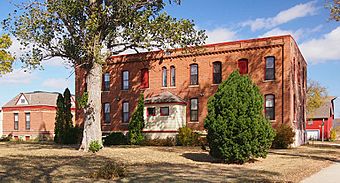Wabasha County Poor House facts for kids
Quick facts for kids |
|
|
Wabasha County Poor House
|
|

The Wabasha County Poor House from the southwest
|
|
| Location | Hiawatha Drive, Wabasha, Minnesota |
|---|---|
| Area | 5 acres (2.0 ha) |
| Built | 1879, 1883 |
| Architect | E. Alexander and William B. Lutz |
| NRHP reference No. | 82003064 |
| Designated | August 26, 1982 |
The Wabasha County Poor House was a special place in Wabasha, Minnesota. It was a group of buildings that helped people in need. From 1873 to the 1930s, Wabasha County ran this place. It was like an early community center for people who needed a home or help.
The buildings include a hospital built in 1879 and a living area from 1883. There was also a barn and a shed. This important site is listed on the National Register of Historic Places. It shows how local governments tried to help people before modern support programs existed.
Contents
What Did the Buildings Look Like?
The main living building was a two-story brick structure. It was shaped like the letter "L" and sat on a strong stone base. The front of the building was about 76 feet (23 meters) long. The back part stretched out about 64 feet (20 meters).
The roofline had simple brick decorations. The main entrance used to have a fancy porch. Later, this was changed to an enclosed entryway with a ramp.
The Hospital Building
Just north of the main living building was the hospital. This was a one-story brick building. It measured about 20 by 30 feet (6 by 9 meters). The hospital had decorative brickwork under its roof. It also had a special, slightly flat, sloped roof. A small wooden addition was built onto its north side.
A History of Helping People
In 1864, the government of Minnesota passed a law. This law said that every county in the state needed to help its poor and elderly residents. So, in 1867, Wabasha County started its first "poor farm." This farm was on 160 acres (65 hectares) of land.
However, this first location was too far away and too big to manage easily. So, in 1873, the county bought 32 acres (13 hectares) closer to Wabasha.
New Buildings for a New Purpose
The main building on the new property was once a barn. It had been changed into a dance hall. Even though the owner fixed it up, the buildings were not quite right for a poorhouse. So, new buildings were slowly built. The hospital was finished in 1879. The larger living building was completed in 1883.
The 1883 building had rooms for residents. It also had a kitchen and a dining room. Plus, it had living quarters for the person in charge, called the superintendent.
Changes in How We Help
For a long time, local governments and groups helped people in need. But this changed during the Great Depression in the 1930s. That's when the United States started Social Security. This was a new federal program to help people.
People living in county facilities like the poorhouse could not get all these new benefits. So, many residents moved out. Wabasha County then decided to lease the poorhouse to a private company. It became a for-profit rest home. This way, residents could stay and still get federal benefits.
The facility stopped being a rest home in 1952. It was empty for four years. But from 1956 into the 1980s, the main building was used as a restaurant and a home. The Wabasha County Poor House is one of the few remaining examples of the many poorhouses built in Minnesota.



